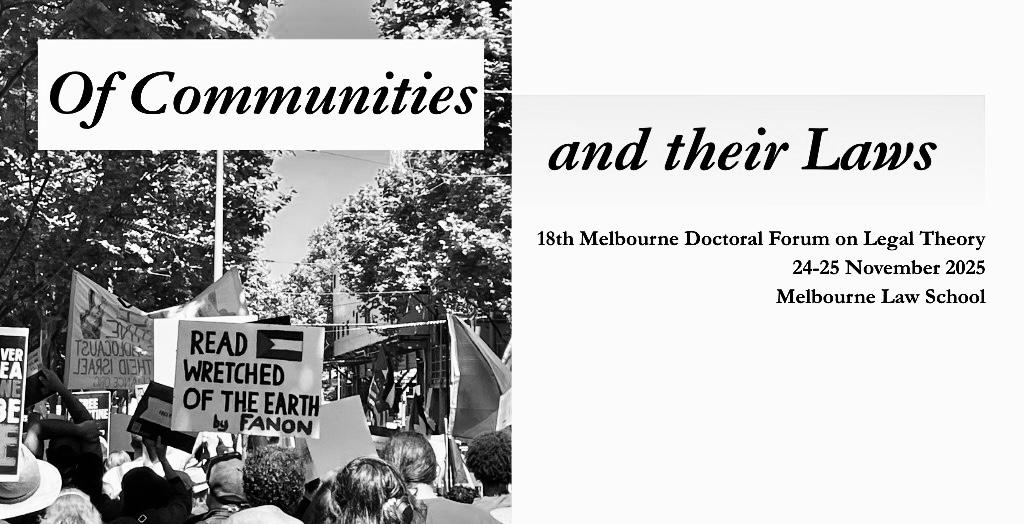


The 18th Melbourne Doctoral Forum on Legal Theory (DFLT-18) is an annual interdisciplinary workshop hosted by graduate researchers at Melbourne Law School. The Forum brings together graduate researchers and early career scholars from diverse backgrounds to reflect critically, methodologically, and collaboratively on law and legal theory.
We aim to foster a welcoming, supportive, and intellectually generative environment for researchers at all stages of their doctoral journeys. Whether your work is theoretical, empirical, doctrinal, historical, community-based, or practice-informed, we warmly invite you to participate.
The theme for this year’s Forum is Of Communities and Their Laws. This theme invites reflection on how laws create, govern and resist relationships between people, institutions, ideas, and communities.
Call for Papers
In a time of ongoing, deepening, and intersecting crises, engagement with the concept of communities in legal theory takes on renewed urgency and significance. Communities emerge in and through relation. The Forum explores laws not only as a system of rules or governance, but also their relationships to and within communities. Communities may be chosen or inherited, temporary or enduring. From treaty negotiations to protest regulations, workplace relations to refugee resettlement, housing access to environmental justice, laws shape communities and vice versa.
Some communities author and assert their laws or orders; others are persistently denied legal recognition. Laws can be used to enable connection or to enforce exclusion. Laws govern access to land, education, citizenship, and collective life. Yet laws also depend on communities to take shape: as interpreters, resistors, reformers, or co-creators.
This year’s Forum reflects on the communities that make legal research possible: research participants, subjects, collaborators, interlocutors, caretakers, teachers, and peers. What does it mean to produce knowledge in relation to and with, rather than about, others? How can we think about the positionality of legal researchers working with communities?
We invite papers that explore, but are not limited to, the following thematic strands:
- Plural Legalities, Fractured Sovereignties
Customary, Indigenous, and religious legal orders; legal pluralism and overlapping jurisdictions; contestations over what constitutes law.
- Recognition and Refusal
The politics of legal recognition and the strategic refusal of it; the role of law in enabling or denying collective autonomy.
How law encodes memory, belonging, and history; community formation through land, ritual, and intergenerational ties; law’s role in spatial displacement or preservation.
- Who Speaks for the Community?
Tensions around representation, voice, and authority within communities; gendered, racialised, and generational exclusion; the role of law in legitimising certain spokespersons over others.
Legal borders of inclusion and exclusion; citizenship, statelessness, and the production of legal personhood; everyday negotiations of legal identity and communal belonging.
- Communities of Resistance
Collective resistance to legal authority; community organising, protest, and mutual aid; the legal and extra-legal infrastructures of abolition, survival, and solidarity.
- Legal Knowledge, Communal Archives
Whose knowledge counts as legal? Oral traditions, memory work, and counter-archives; law as story, ritual, and inherited struggle.
- Communities of Research and Method
Law and legal theory as relational work; ethics of care, positionality, social and humanities methods, and reciprocity in research; scholarship as collaboration rather than extraction.
We particularly encourage interdisciplinary and collaborative approaches. You do not need to be a legal theorist—so long as law features in your research, your contribution is welcome.
Format
The DFLT-18 will be held in person at Melbourne Law School on 24 – 25 November 2025. We envision a series of paper presentations and participant-led discussions, organised into thematic panels. A hybrid option may be offered for one panel to accommodate accessibility needs.
We also welcome proposals for visual, multimedia, or non-traditional presentation formats. If you have an alternative presentation structure in mind, please let us know.
Expression of Interest
Please send your 300-word abstract as an email attachment to the email address at [email protected]
Subject line: “Abstract Submission for Melbourne Doctoral Forum 2025” by 20 July 2025.
Include:
- ● Full name and institutional affiliation
- ● Email and contact details
- ● A short biography (up to 100 words)
Deadline for abstract submission: 20 July 2025
Notice of acceptance: 4 August 2025
Final paper submission (3000–6000 words, inclusive of footnotes): 5 October 2025
In-person Forum: 24-25 November 2025
We warmly welcome non-presenting participants to attend MDFLT-18 as observers. Your presence offers valuable support and engagement with our presenters. To register your interest in attending, please complete this form by 23 September 2025.
Funding
The Forum has limited funding to support travel and accommodation costs. Priority will be given to participants from underfunded institutions or those based in the Global South. We strongly encourage all applicants to seek institutional support where possible. Please indicate in your application if you would like to be considered for a bursary.
Contact Us
Email: [email protected]
Twitter/X: @doctoral_forum
Website: https://law.unimelb.edu.au/research/research-activities/research-fora/dflt
DFLT-18 Organisers
Fia Hamid-Walker
(Convenor, on behalf of the DFLT-18 Organising Committee)
DFLT-18 is supported by an extended working group of volunteers, contributors, and co-dreamers.






